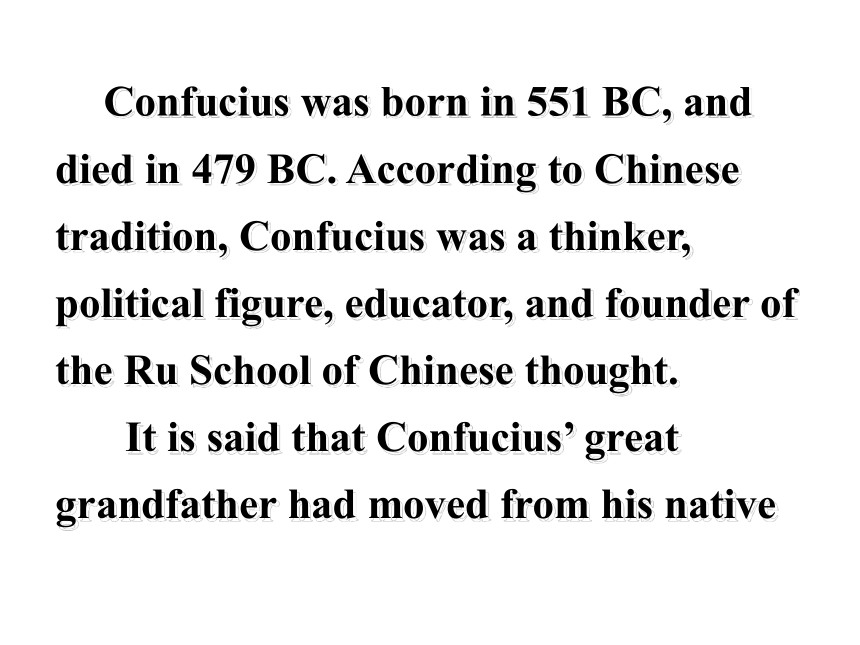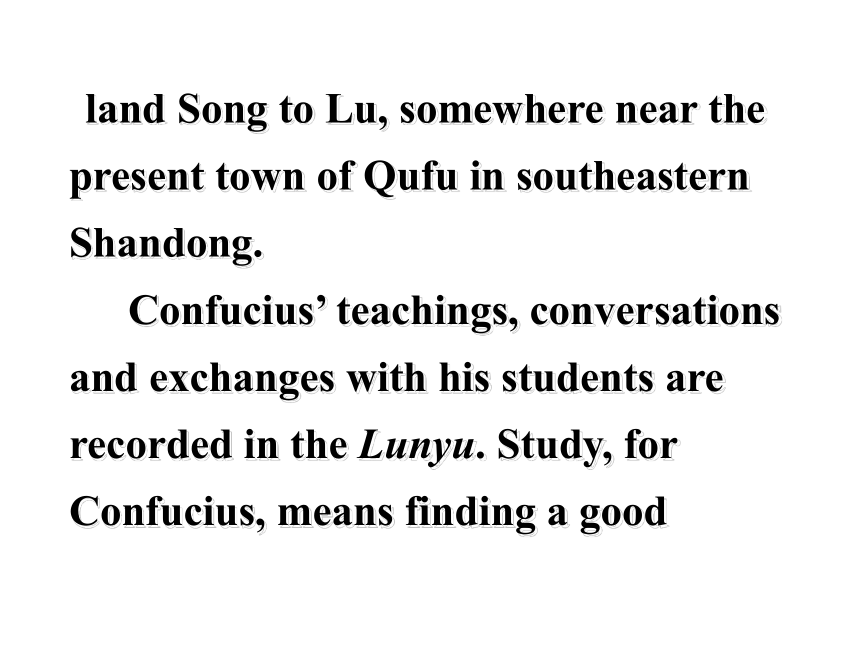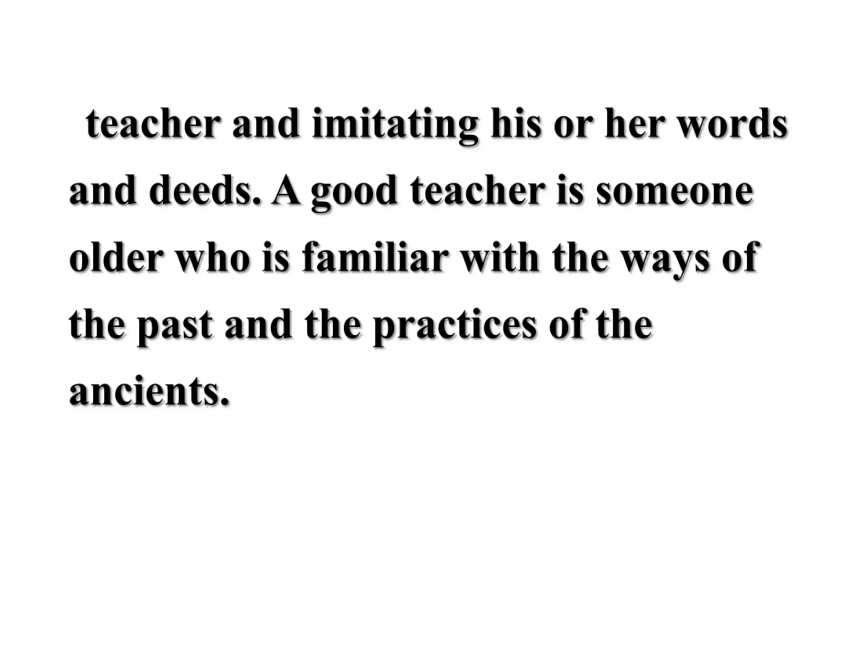Module 7 Great books Unit1 We’re still influenced by Confucius 课件
文档属性
| 名称 | Module 7 Great books Unit1 We’re still influenced by Confucius 课件 |

|
|
| 格式 | zip | ||
| 文件大小 | 960.3KB | ||
| 资源类型 | 教案 | ||
| 版本资源 | 外研版 | ||
| 科目 | 英语 | ||
| 更新时间 | 2017-08-29 00:00:00 | ||
图片预览









文档简介
课件27张PPT。Unit1
We're still influenced by Confucius.Warming up Confucius was born in 551 BC, and died in 479 BC. According to Chinese tradition, Confucius was a thinker, political figure, educator, and founder of the Ru School of Chinese thought.
It is said that Confucius’ great grandfather had moved from his native land Song to Lu, somewhere near the present town of Qufu in southeastern Shandong.
Confucius’ teachings, conversations and exchanges with his students are recorded in the Lunyu. Study, for Confucius, means finding a good teacher and imitating his or her words and deeds. A good teacher is someone older who is familiar with the ways of the past and the practices of the ancients. Anton Makarenko was born in 1888 and died in 1939. He was one of the outstanding Soviet educators.
Makarenko’s works, which shows his way of teaching: “... education is a process that is social in the broadest sense....With all the highly complex world of ambient activity, the child enters into an infinite number of relationships, each of which constantly develops, interweaves with other relationships and is compounded by the child’s own physical and moral growth. All this ‘chaos’ is seemingly quite unquantifiable but nevertheless gives rise at each particular instant to definite changes in the personality of the child.” Anne Sullivan (1866-1936) was a devoted teacher who, despite her own handicap, demonstrated a tireless commitment to a student (Helen Keller) who had severe learning disabilities. She developed a method of touch teaching, using direct experience rather than attempting to explain a concept; and she reasoned that children learned by imitation and repetition, working out their own understanding of the subject.
Mr. Tao Xingzhi is a great Chinese educationalist for the people. Born on October 18 in She County of Anhui Province, he went to study in the US after graduating from Jinling University in 1914. He came back to China in 1917. Mr. Tao Xingzhi was always “giving whole-heartedly to the people and taking nothing back”, sharing both happiness and sadness with the general public and working closely with Chinese Communist Party. Mr. Tao spared no effort for his whole life and had made indelible contribution to the cause of people’s education, liberation and democracy. Mr. Tao Xingzhi left behind works of 6 million words, which are treasures for the mankind. Pooling the souls of thinking of different educationists, he founded the theory of “Life Education”, laying the spiritual foundation for the reform and development of Chinese people’s education. Mr. Guo Moruo praised him “Two thousand years ago, we had Confucius, and now two thousand years later, we have Mr. Tao Xingzhi”. A learned and respectable paragon for teachers, Mr. Tao is deserved to be a “Giant” in China’s modern history of education. Mr. Tao Xingzhi belongs to not only China, but also the whole world.551-
497
BCChinaFinding a
good
teacher
And
imitating
his or her
words and
deedsEntering
into a lot of
relationships,
each of
which
constantly
develops, interweavesRussia1888-
1939Russia1888-
1939with other
relationships
and is
compounded by the
child’s own
physical and
moral
growth.Using direct
experience
rather than
attempting
to explain a
concept; learning byAmerica1866-
1936imitation,
repetition,
and working
out their own
understanding
of the subject1891-
1946China
To give all
citizens equal
opportunities
for education.
To create an
environment
that would
encourage
learning and the
1891-
1946China
development
of learning.
To live a
democratic
life through
experiencing
the
democratic
process.Homework 1. Remember the information about the famous educators and review your notes about the differences and similarities between the education in China and the USA. 2. Learn the new words by heart and remember their English explanations as many as possible.
We're still influenced by Confucius.Warming up Confucius was born in 551 BC, and died in 479 BC. According to Chinese tradition, Confucius was a thinker, political figure, educator, and founder of the Ru School of Chinese thought.
It is said that Confucius’ great grandfather had moved from his native land Song to Lu, somewhere near the present town of Qufu in southeastern Shandong.
Confucius’ teachings, conversations and exchanges with his students are recorded in the Lunyu. Study, for Confucius, means finding a good teacher and imitating his or her words and deeds. A good teacher is someone older who is familiar with the ways of the past and the practices of the ancients. Anton Makarenko was born in 1888 and died in 1939. He was one of the outstanding Soviet educators.
Makarenko’s works, which shows his way of teaching: “... education is a process that is social in the broadest sense....With all the highly complex world of ambient activity, the child enters into an infinite number of relationships, each of which constantly develops, interweaves with other relationships and is compounded by the child’s own physical and moral growth. All this ‘chaos’ is seemingly quite unquantifiable but nevertheless gives rise at each particular instant to definite changes in the personality of the child.” Anne Sullivan (1866-1936) was a devoted teacher who, despite her own handicap, demonstrated a tireless commitment to a student (Helen Keller) who had severe learning disabilities. She developed a method of touch teaching, using direct experience rather than attempting to explain a concept; and she reasoned that children learned by imitation and repetition, working out their own understanding of the subject.
Mr. Tao Xingzhi is a great Chinese educationalist for the people. Born on October 18 in She County of Anhui Province, he went to study in the US after graduating from Jinling University in 1914. He came back to China in 1917. Mr. Tao Xingzhi was always “giving whole-heartedly to the people and taking nothing back”, sharing both happiness and sadness with the general public and working closely with Chinese Communist Party. Mr. Tao spared no effort for his whole life and had made indelible contribution to the cause of people’s education, liberation and democracy. Mr. Tao Xingzhi left behind works of 6 million words, which are treasures for the mankind. Pooling the souls of thinking of different educationists, he founded the theory of “Life Education”, laying the spiritual foundation for the reform and development of Chinese people’s education. Mr. Guo Moruo praised him “Two thousand years ago, we had Confucius, and now two thousand years later, we have Mr. Tao Xingzhi”. A learned and respectable paragon for teachers, Mr. Tao is deserved to be a “Giant” in China’s modern history of education. Mr. Tao Xingzhi belongs to not only China, but also the whole world.551-
497
BCChinaFinding a
good
teacher
And
imitating
his or her
words and
deedsEntering
into a lot of
relationships,
each of
which
constantly
develops, interweavesRussia1888-
1939Russia1888-
1939with other
relationships
and is
compounded by the
child’s own
physical and
moral
growth.Using direct
experience
rather than
attempting
to explain a
concept; learning byAmerica1866-
1936imitation,
repetition,
and working
out their own
understanding
of the subject1891-
1946China
To give all
citizens equal
opportunities
for education.
To create an
environment
that would
encourage
learning and the
1891-
1946China
development
of learning.
To live a
democratic
life through
experiencing
the
democratic
process.Homework 1. Remember the information about the famous educators and review your notes about the differences and similarities between the education in China and the USA. 2. Learn the new words by heart and remember their English explanations as many as possible.
同课章节目录
- Module 1 Wonders of the world
- Unit 1 It's more than 2,000 years old.
- Unit 2 The Grand Canyon was not just big.
- Unit 3 Language in use
- Module 2 Public holidays
- Unit 1 My family always go somewhere interesting a
- Unit 2 We have celebrated the festival since the f
- Unit 3 Language in use
- Module 3 Heroes
- Unit 1 She trained hard,so she became a great play
- Unit 2There were few doctors, so he had to work ve
- Unit 3 Language in use
- Module 4 Home alone
- Unit 1 I can look after myself, although it won’t
- Unit 2 I became so bored with their orders that I
- Unit 3 Language in use
- Module 5 Museums
- Unit 1 Don't cross that rope!
- Unit 2 If you ever go to London, make sure you vis
- Unit 3 Language in use
- Module 6 Problems
- Unit 1 If I start after dinner, I'll finish it be
- Unit 2 If you tell him the truth now, you will sho
- Unit 3 Language in use
- Revision Module A
- Module 7 Great books
- Unit 1 We're still influenced by Confucius's idea
- Unit 2 It is still read and loved.
- Unit 3 Language in use
- Module 8 Sports life
- Unit 1 Daming wasn't chosen for the team last time
- Unit 2 He was invited to competitions around the w
- Unit 3 Language in use
- Module 9 Great inventions
- Unit 1 Will computers be used more than books in t
- Unit 2 Will books be replaced by the Internet?
- Unit 3 Language in use
- Module 10 Australia
- Unit 1 I have some photos that I took in Australia
- Unit 2 The game that they like most is Australian
- Unit 3 Language in use
- Module 11 Photos
- Unit 1 He's the boy who won the photo competition
- Unit 2 The photo which we liked best was taken by
- Unit 3 Language in use
- Module 12 Save our world
- Unit 1 If everyone starts to do something, the wor
- Unit 2 Repeat these three words daily: reduce, reu
- Unit 3 Language in use
- Revision Module B
